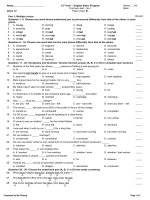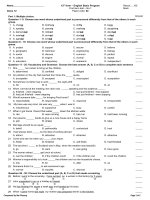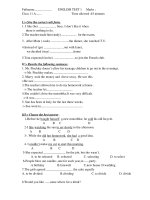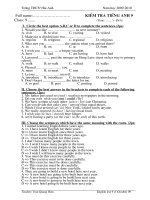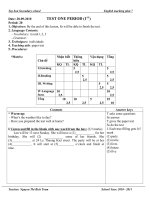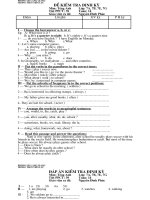English objective test 1 Time allowed: 90 min ppsx
Bạn đang xem bản rút gọn của tài liệu. Xem và tải ngay bản đầy đủ của tài liệu tại đây (41.97 KB, 8 trang )
English objective test 1
Time allowed: 90 min.
Part A: Phonetics
I. Find a word in each line which is pronounced differently in the part underlined.
1- a. stage b. village c. manage d. baggage
2- a. supply b. superb c. support d. suppose
3- a. eight b. weight c. height d. freight
4- a. game b. gist c. gift d. forgive
5- a. phase b. danger c. bookcase d. literature
II. Find the word which has different stress pattern from the other three.
6- a. sincerity b. remarkable c. curriculum d. combination
7- a. demanding b. concerning c. finishing d. beginning
8- a. parliament b. position c. successful d. abolish
9- a. referee b. voluntary c. paradise d. parachute
10- a. magazine b. herbivore c. visible d. hydrogen
Part B: lexico - grammar
I. Choose the correct preposition or adverb for each sentence.
11. When you have thought what I have said, you will understand.
A. of B. over C. about D. again
12. To come means to meet by chance.
A. into B. across C. between D. up
13. I could tell he was pleased the expression on his face.
A. by B. for C. at D. in
14. It isn’t quite certain that he will turn at the meeting.
A. up B. back C. down D. on
15. One of the primary causes of skin cancer is overexposure the sun without the use of
sunscreen.
A. in B. under C. with D. to
II. Choose the correct answer for each of the following sentences.
16. You’ll get a better of exchange at another bank.
a. rate b. value c. worth d. charge
17. Science has a language that is in every country.
a. alike b. similar c. same d. the same
18. I lost too much money betting at the races last time, so you won’t me to go again.
a. convince b. impress c. persuade d. urge
19. Last year the potato harvest was very disappointing, but this year it looks as though we shall
have a better .
a. product b. outcome c. amount d. crop
20. The shop assistant was helpful, but she felt he could have given her more advice.
a. entirely b. exactly c. quite d. totally
21. It’s an awful Jane couldn’t come. I was looking forward to meeting her.
a. harm b. sorrow c. shame d. shock
22. The new manager explained to the staff that she hoped to new procedures to save time
and money.
a. restore b. control c. establish d. manufacture
23. I like his essay because it is very .
a. imaginary b. imaginative c. imaginable d. imagination
24. Everyone knows about pollution problems, but not many people have any solutions.
a. looked into b. thought over c. got round to d. come up with
25. I don’t know what was wrong with her this morning. She is usually quite .
a. glad b. pleased c. cheerful d. satisfied
26. The air in the house felt cold and …… after weeks of bad weather.
a. wet b. moist c. damp d. watery
27. He has a very …… temper and often says things he regrets later.
a. angry b. quick c. warm d. bad
28. Don’t forget your appointment. You’d better put it in your .
a. agenda b. diary c. calendar d. directory
29. You know I’ll always stand you if you are in trouble.
a. by b. with c. for d. up
30. The taxi drew at the gate promptly at six o’clock.
a. up b. along c. outside d. over
III. Decide the underlined word or phrase (marked A, B, C, or D) in each sentence that
needs correcting.
31. Candles have been use since the prehistoric era.
A B C D
32. Noise pollution in big cities can be controlled in the number of ways.
A B C D
33. Sweetly smelling perfumes are added to soap to make it appealing.
A B C D
34. Many people believe that food additive and other chemicals used in the production and
A B C
processing of foods harm the body.
D
35. Many elephants they die after they lose their teeth and can no longer chew food.
A B C D
36. Calculus was invented to deal with problems that could not be solving using algebra or
A B C D
geometry.
37. Davis devoted his last year to write at his home in Biloxi, near the Gulf of Mexico.
A B C D
38. Often the bottom of a fan or skillet becomes black when it is placed among a fire.
A B C D
39. Isabella danced in her bare feet and wore loose-fitting clothing garments that allowed
A B C D
her freedom of movement.
40. Light rays that enter the eye must come to a point focus for a clear vision to form.
A B C D
IV. Choose the correct word form for each of the numbered gaps.
There can’t be many people who are (41) of e-mail, even if they have never actually sent one.
Although there are some (42) between e-mail and letters, there are also many differences.
The first is that e-mail is delivered (43) , so it can be a very (44) means of communication
when speed is important. This speed means that e-mail is more (45) for communicating over
large distances. Another difference is that e-mail tends to be (46) informal. People are much
more likely to use language which they would consider (47) for a formal letter. Words
spelled (48) in an e-mail are less likely to be checked than in a letter. One explanation for this
is that an e-mail seems to be less permanent than something (49) on paper. We can be sure
that the future development of e-mail will have all kinds of (50) effects on the way we
communicate.
41. A. aware B. unaware C. awareness D. unawareness
42. A. similar B. similarity C. similarities D. dissimilar
43. A. instant B. instance C. instances D. instantly
44. A. effect B. effecting C. effective D. effected
45. A. practice B. practiced C. practical D. impractical
46. A. related B. relating C. relative D. relatively
47. A. suited B. suitable C. unsuitable D. suitably
48. A. correct B. incorrect C. correctly D. incorrectly
49. A. written B. writing C. to write D. being written
50. A. expected B. unexpected C. expecting D. unexpectedly
Part c: Reading
I. Read the two passages, then choose the correct answer for each question.
- Noah Webster’s goal in life was to promote the adoption of an American language. He wanted
to free Americans from British English as they had freed themselves from the British crown. To
this end he published a series of three textbooks: a speller in 1783, a grammar in 1784, and a
reader in 1785.
Webster objected to the way certain words had been borrowed from other languages, but had not
been respelled. The result, he claimed, was a confusing mixture of letters, many of which were
not pronounced the way they looked, and others of which were not pronounced at all.
Webster urged Americans to simplify their spelling. For example, he argued that “head” should
be spelled “hed” and “bread” should be spelled “bred”. Most of Webster’s suggestions did not
catch on, but his textbooks sold millions of copies.
51. Which of the following is the best title for the passage?
a. Three books of Noah Webster b. Noah Webster and the Adoption of an American
Language
c. Simplification of Spelling d. Noah Webster and the British Crown
52. According to Webster, Americans should .
a. avoid reading his three books b. be ruled from England
c…simplify their spelling d. not borrow words from other languages
53. In the last paragraph, the phrase “did not catch on” means .
a. were not appreciated c. did not please anyone
b. did not become popular d. were not intelligent
54. Webster’s books were very innovative, specially when we consider that they were written in
the
a. late eighteenth century c. mid-seventeenth century
b. early eighteenth century d. late seventeenth century
55. The problems that Webster tried to solve did NOT include .
a. unreliable spelling c. grammar errors
b. mispronounced words d. poor sales of his textbooks
- All humans do not have the same type of blood. In different types of blood, certain antibodies
and antigens may or may not be present. There are different systems for classifying blood, and
one of the systems is the ABO system. In this system, a person’s blood is classified as either type
A, type B, type AB, or type O. The purpose of this system is to describe which types of blood are
compatible. This means which types of blood can be taken from or given to a person. There are
three principles that govern which types of blood are compatible.
The first principle is that a particular blood type is always compatible with itself. This means, for
example, that a person with type A blood can receive type A blood and that a person with type B
can accept type B blood. It also means that a person with type AB blood can receive type AB
blood and that a person with type O blood can receive type O blood.
The second principle is that type O blood can be given to any of the other blood groups. Type O
can be given to a patient with types A, B, or AB blood. For this reason, type O is called the
universal donor.
The last of the principles is that patients with type AB blood can receive blood from type A, B, or
O. This means that patients with type AB blood can compatibly receive any other type of blood.
56. The topic of this passage is .
a. a particular type of blood b…a system for classifying types of blood
c…examples of problems with blood d. the principle of universal donor
57. It is stated in the passage that certain antibodies and antigens in the blood .
a. are omitted from the ABO system b. have not been classified
c…are the universal donors d. may not be in all blood
58. Look at the word principles in paragraph 1. Principles are (a. leaders b. effects c. rules d.
trials)
59. It can be inferred from the passage that type A blood can .
a. accept types A or O blood b. accept types O or AB blood
c. accept types A or AB blood d. accept types A or B blood
60. Look at the word donor in paragraph 3. A donor is most likely someone who .
a. receives b. gives c. shows d. takes
II. Choose the correct option to put in each of the numbered gaps.
The history of the bicycle goes back more than 200 years. In 1791, Count de Sivrac _____(61)
onlookers in a park in Paris as he showed off his two-wheeled invention, a machine called the
‘celerifere’. It was basically an _____(62) version of a children’s toy which had been in
_____(63) for many years. Sivrac’s ‘celerifere’ had a wooden frame, made in the _____(64) of a
horse, which was mounted on a wheel at either end. To ride it, you sat on a small seat, just like a
modern bicycle, and pushed ____(65) against the _____(66) with your legs – there were no
pedals. It was impossible to steer a ‘celerifere’ and it had no brakes, but despite these problems
the invention very much _____(67) to the fashionable young men of Paris. Soon they were
_____(68) races up and down the streets. Minor _____(69) were common as riders attempted a
final burst of _____(70). Controlling the machine was difficult as the only way to change
_____(71) was to pull up the front of the ‘celerifere’ and _____(72) it round while the front
wheel was _____(73) in the air.
“Celerifere’ were not popular for long, however, as the _____(74) of no springs, no steering and
rough roads made riding them very uncomfortable. Even so, the wooden ‘celerifere’ was the
_____(75) of the modern bicycle.
61 A. delighted B. cheered C. appreciated D. overjoyed
62 A. increased B. enormous C. extended D. enlarged
63 A. use B. play C. operation D. service
64 A. resemblance B. shape C. body D. appearance
65 A. fast B. deeply C. heavily D. hard
66 A. surface B. ground C. earth D. floor
67 A. attracted B. appealed C. took D. called
68 A. going B. getting C. holding D. making
69 A. wounds B. trips C. injuries D. breaks
70 A. velocity B. energy C. pace D. speed
71 A. direction B. route C. heading D. way
72 A. roll B. drive C. turn D. revolve
73 A. cycling B. circling C. winding D. spinning
74 A. mixture B. link C. combination D. union
75 A. origin B. design C. model D. introduction
III. Choose the correct connectives for the gaps in the following passage.
Our weather is not beautiful all the time. Perhaps you can remember a day (76) bad
weather made you afraid. One kind of bad weather (77) scares many people is called a
thunderstorm.
This is (78) happens when there is a thunderstorm. (79) you see a sudden flash of
bright light. (80) a few seconds you hear a loud rumbling sound. This quick flash is called
lightning, (81) the loud sound is called thunder. Lightning is colorful; (82) it can cause
serious problems.
Lightning is electricity (83) is moving very rapidly. It may be moving between a
cloud and the ground, between two parts of the same cloud. The lightning heats the air around it.
This hot air expands, (84) gets bigger, and it causes the air to move in waves. The air waves
pass you in a series, one after another. (85) you may hear many rumbles and not just one
sound.
76 A. when B. which C. that D. what
77 A. when B. who C. that D. what
78 A. when B. whose C. that D. what
79 A. First B. Firstly C. To begin D. At the beginning
80 A. Within B. Without C. With D. Before
81 A. but B. and C. or D. furthermore
82 A. furthermore B. however C. but D. and
83 A. when B. where C. that D. what
84 A. but B. however C. or D. moreover
85 A. That’s why B. The result C. So D. So that
Part D: Writing
I. Choose the sentence nearest in meaning to the one in italics.
86. I wish she was going to the party.
a. I hope she’ll come to the party. B. I’m sorry she isn’t going to the
party.
c. I’m sorry she didn’t come to the party. d. I’m pleased she might come
to the party.
87. He asked her if she would meet him that evening.
a. He said to her: “ Did you meet me that evening?”
b. If he asks her, she’ll meet him this evening.
c. He said: “Would you meet me one evening if I asked you?”
d. He said to her: “Will you meet me this evening?”
88. It was not as far to the town as we thought.
a. As we thought, the town wasn’t far away. b. We thought the town was far, and it
was.
c. The town was nearer than we thought. d. We thought the town was nearer than it
was.
89. Do you realize that I would have been given that job if you had not been silent?
a. As you did not talk I did not get the job. B. Because you asked I did not get the
job.
c…Although you asked I got the job. D. Although you did not talk I got the
job.
90. When the power failed, we went to a restaurant for dinner.
a. We had dinner at the restaurant because of a power cut.
b. The power failed just as we were going out for dinner.
c. We were having dinner at a restaurant when the power failed.
d. There was going to be a power cut, so we went out for a dinner.
91. It was unfair that Paul failed the driving test.
a. Paul failed the driving test because he was unfair.
b. Paul didn’t deserve to fail the driving test.
c. It was unfair of Paul to fail the driving test.
d. Paul was not fair in doing the driving test.
92. It is possible Hoa didn’t hear her name being called.
a. It is possible for Hoa to hear them call her name.
b. Hoa was not able to hear her name being called.
c. Hoa might not have heard them call her name.
d. Hoa might not hear her name being called.
93. I regret not visiting Washington when I was in America.
a. I regret to say that I didn’t like to visit Washington when I was in America.
b. I visited Washington when I was in America but now I regret it.
c. I don’t regret visiting Washington when I was in America.
d. I now wish I had visited Washington when I was in America.
94. Could you connect me to the director’s office, please?
a. Could you direct me to the director’s office, please?
b. Could you put me through to the director’s office, please?
c. Could you come with me to the director’s office, please?
d. Could you allow me to talk to the director please?
95. I am afraid we have run out of Guardian newspapers.
a. I am afraid we have run into a Guardian.
b. There are not any Guardian newspapers left, I am afraid.
c. There won’t be any Guardian newspapers to be published, I am afraid.
d. I am afraid we can’t run Guardian newspapers any more.
II. Decide the sentence A, B, C, or D that is different in meaning to the original sentence.
96. It was my refusal to obey the policeman that caused my arrest.
A. It was because I refused to obey the policeman that I was arrested.
B. My refusal to obey the policeman resulted in my arrest.
C. I didn’t obey the policeman, so I was arrested.
D. I was arrested, so I refused to obey the policeman.
97. I am sure it was by mistake that he took your calculator.
A. He must have taken your calculator by mistake.
B. I am sure he didn’t take your calculator deliberately.
C. It is certain he didn’t take your calculator on purpose.
D. It is a mistake that he took your calculator.
98. For fear of waking up the family, Trung tiptoed upstairs.
A. Trung tiptoed upstairs because he didn’t want to wake up the family.
B. Trung tiptoed upstairs so as not to wake up the family.
C. The family feared when Trung tiptoed upstairs.
D. Trung tiptoed upstairs lest the family should be woken up.
99. But for the principal’s help, we would have got into serious trouble.
A. If the principal hadn’t helped us, we would have got into serious trouble.
B. Without the principal’s help, we would have been in serious trouble.
C. Thanks to the principal’s assistance, we managed to avoid serious trouble.
D. We got into serious trouble, but the principal refused to help us.
100. It would be a good idea if you went and asked her yourself.
A. You had better go and ask her yourself.
B. I advise you to go and ask her yourself.
C. I suggest you go and ask her yourself.
D. You went and asked her yourself and that was good.
®¸p ¸n
English objective test 1
1.A 2.B 3.C 4.B 5.D
6.D 7. C 8. A 9. A 10.A
11.B 12.B 13.A 14.A 15.D
16.A 17.D 18.C 19.D 20.C
21.C 22.C 23.B 24.D 25.C
26.C 27.B 28.B 29.A 30.A
31.B 32.C 33.A 34.A 35.A
36.C 37.B 38.D 39.C 40.C
41.B 42.C 43.D 44.C 45.C
46.D 47.C 48.D 49.A 50.B
51.B 52.C 53.B 54.A 55.D
56.B 57.D 58.C 59.A 60.B
61.A 62.D 63.A 64.B 65.D
66.B 67.B 68.C 69.C 70.D
71.A 72.C 73.D 74.C 75.A
76.A 77.C 78.D 79.A 80.A
81.B 82.B 83.C 84.C 85.A
86.A 87.D 88.C 89.A 90.A
91.B 92.C 93.D 94.B 95.B
96.D 97.D 98.C 99.D 100.D


